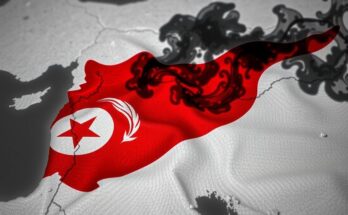Laos’ Prime Minister Sonexay Siphandone has officially transferred the chairmanship of ASEAN to Malaysia’s Prime Minister Anwar Ibrahim after a fruitful summit. Laos received commendations for its leadership, particularly in dealing with the Myanmar situation and regional tensions. Malaysia’s upcoming chairmanship aims for inclusivity and sustainability, with active engagement expected from ASEAN in addressing critical issues, including the South China Sea and Timor-Leste’s accession.
On October 14, 2024, Laotian Prime Minister Sonexay Siphandone passed the chairmanship of ASEAN to Malaysian Prime Minister Anwar Ibrahim during a closing ceremony for the recent leaders’ summit held in Vientiane. Throughout the past year, Laos has adeptly led the regional bloc and demonstrated significant influence despite its relatively small size and economic stature when compared to larger nations like Indonesia. Addressing the Myanmar crisis was a notable aspect of Laos’ leadership. Contrary to skepticism regarding their stance, Laos upheld the principles set forth by ASEAN, particularly regarding the treatment of the military junta that has faced exclusion from official forums. This was evidenced by the careful approval process for the junta’s representation during the summit. At the recent East Asia Summit, leaders tackled pressing global issues, including the Korean Peninsula situation and Russia’s continued aggression in Ukraine, demonstrating ASEAN’s growing engagement with international matters. Prime Minister Anwar’s upcoming chairmanship will commence in January, with the theme of “Inclusivity and Sustainability”. His extensive expertise in ASEAN affairs raises expectations that he will effectively navigate the bloc’s ongoing challenges and contribute towards the ASEAN 2045 vision. In terms of future dynamics, Indonesia, under incoming leader Prabowo Subianto, is anticipated to adopt a more proactive approach to regional diplomacy compared to the past administration of President Joko “Jokowi” Widodo, who notably missed the summit. Critical matters remain on ASEAN’s agenda: addressing the dire situation in Myanmar, expediting Timor-Leste’s accession, and advancing negotiations regarding the South China Sea. Thai Prime Minister Paetongtarn Shinawatra has proposed hosting an informal meeting focused on Myanmar, advocating for involvement from significant players like China and India to assist in resolving the ongoing conflicts. Furthermore, there is a broad consensus supporting the swift admission of Timor-Leste into ASEAN, with cooperation established among member states to facilitate its fulfillment of necessary conditions. Lastly, Laos’s chairmanship emphasized a united ASEAN approach towards engaging China in dialogues concerning the South China Sea, promoting the conclusion of a code of conduct to ensure peace and stability in the region.
The transition of ASEAN’s chairmanship from Laos to Malaysia signifies both a change in leadership style and priorities within the organization. Laos’ tenure highlighted its capability to manage regional diplomacy effectively, particularly in response to crises such as the unrest in Myanmar. ASEAN’s strategic importance in Southeast Asia is compounded by geopolitical tensions, exemplified by the South China Sea dispute and relations with major powers like China and the United States. The bloc’s navigation of these issues reveals the necessity for cohesive and collaborative action among member nations, especially with ongoing dialogues concerning membership expansions and conflict resolutions.
The leadership transition from Laos to Malaysia marks a significant juncture for ASEAN as it prepares to face pressing regional and international issues. Laos successfully managed the bloc’s affairs under challenging circumstances, particularly in the context of Myanmar and the South China Sea. Looking forward, the incoming chairpersonship of Malaysia is expected to foster inclusivity and sustainability while addressing unfinished business, such as Timor-Leste’s accession and the pressing need for effective governance regarding regional tensions.
Original Source: asianews.network




